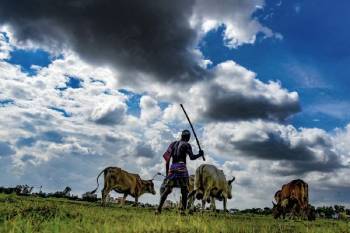New Delhi, 09 February 2022: Indian Council of Agricultural Research (ICAR), Ministry of Agriculture and Farmers Welfare, Government of India has launched a flagship network project “National Innovations in Climate Resilient Agriculture (NICRA)” aiming at strategic research on adaptation and mitigation, demonstration of technologies on farmers’ fields and creating awareness among farmers and other stakeholders.
The following steps have been taken in the field of climate smart agriculture:
(i) Developed climate resilient varieties for different abiotic and biotic stresses in major crops. So far 8 climate resilient varieties have been released in rice, green gram, maize and lentil;
(ii) Developed and popularized 65 location-specific climate resilient/smart technologies for wider adoption among the farming communities;
(iii) Prepared 650 district agricultural contingency plans and sensitized State officials for preparedness through 54 State-level interface meetings;
(iv) Developed, evaluated and commercialized implements (raised bed planter-cum-herbicide applicator, maize harvester, zero till planter, etc.) for small farm mechanization suiting to dryland ecologies;
(v) Climate smart technologies developed involving farmers in risk assessment and adaptation techniques in 151 clusters covering 446 villages, with a footprint of 2,13,421 households, on 2,35,874 hectares of land;
(vi) Capacity building programs have been taken up involving 5.15 lakhs comprising researchers, farmers, entrepreneurs, line department officials, policy makers and NGOs in the field of climate resilient agriculture.
Further, the climate smart agriculture is promoted under the Central Sector Schemes of Pradhan Mantri Krishi SinchayeeYojna (PMKSY), Parmparagat Krishi Vikas Yojna (PKVY), Soil Health Mission (SHM), National Bomboo Mission (NBM) and Sub Mission on Agro Forestry (SMAF).
The Government of India has launched the National Mission for Sustainable Agriculture (NMSA), which is one of the eight Missions under the National Action Plan on Climate Change (NAPCC). NAPCC has identified the focus areas on Dryland agriculture, risk management, access to information and use of biotechnology under NMSA and are implemented in schemes of Rainfed Area Development, OnFarm Water Management, Soil Health Management and Climate Change and Sustainable Agriculture: Monitoring, Modelling and Networking.
There is no proposal for creation of National Agriculture Disaster Management scheme to tackle the issues of sudden climatic changes and other issues which are becoming more frequent. However, every Ministry/Department is mandated to prepare a Disaster Management plan under Sections 36/37 of Disaster Management (DM) Act, 2005.
Accordingly, Department of Agriculture and Farmers Welfare has prepared a National Agriculture Disaster Management Plan (NADMP) to include key aspects of Disaster Risk Reduction (DRR) that address climate change adaptation and sustainable development goals related to the agriculture sector.
This information was given by the Union Minister for Agriculture and Farmers Welfare Narendra Singh Tomar in a written reply in Rajya Sabha recently.
Image credit: ap7am.com




















